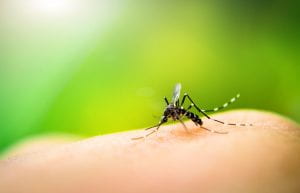 In much of the United States, it’s mosquito season. It can be disappointing to sit down to dinner on your deck only to find yourself covered in itchy, red welts the next day. But you don’t have to let mosquitos chase you back inside. [Read more…]
In much of the United States, it’s mosquito season. It can be disappointing to sit down to dinner on your deck only to find yourself covered in itchy, red welts the next day. But you don’t have to let mosquitos chase you back inside. [Read more…]
Evidence-based Mosquito Control
What We Know About Financial Decisions and the Aging Brain

As people age, some of their cognitive abilities naturally decline. In fact, some skills, such as working memory, peak at age 30 and then begin a gradual waning that is considered a normal part aging. In addition, about 10 percent of people 65 and older develop specific medical conditions that lead to cognitive impairment. [Read more…]
“Will My Cancer Come Back?”

The Centers for Disease Control and Prevention estimates nearly 40 percent of Americans will be diagnosed with cancer at some point in their life. Currently, there are more than 20 million cancer survivors in the United States, and that number is growing.
While surviving cancer is the best-case scenario, it comes with its own issues: potential dental problems, infertility, heart and lung problems, osteoporosis, and more. Doctors have also documented another long-term psychological consequence: fear of the cancer coming back.
A systematic review published earlier this year found that the most common unmet need among cancer survivors is calming that fear. The constant worry often leads to depression, impaired daily functioning, and reduced quality of life. Many cancer survivors worry for years and report that they feel as worried as when they were first diagnosed with cancer.
The review combined data from 46 studies with more than 9,000 participants from 13 countries. The studies all used data from the Fear of Cancer Recurrence Inventory, a widely-accepted survey to identify clinically-significant fear. Nearly 60 percent of study participants had fears that were clinically significant, and nearly 20 percent scored at the highest level, meaning their fear of cancer recurrence was debilitating.
These fears were prevalent regardless of the participant’s type of cancer and where they lived. Women were more likely to experience clinically-significant fear compared to men, and young people were more likely to experience clinically-significant fear compared to older people.
What’s the Solution?
The first step is to recognize when fears become a significant problem. If you are a cancer survivor, you should report worries that interfere with relationships and daily activities to your health care provider. If you are afraid to go to your follow-up cancer appointment or if you feel hopeless about the future, those are also signs you may need some extra help. In addition, be on the lookout for difficulty sleeping or eating well and trouble concentrating or making decisions.
Researchers have tested a wide range of interventions to address the fear of cancer recurrence. One systematic review found therapy is an effective treatment for this problem and that improvements, although small, lasted on average more than seven months after therapy ended. Another found that mind-body interventions, such as meditation, relaxation skills, and cognitive-behavioral training are effective at addressing fear of cancer recurrence.
There is evidence that participating in a support group of cancer survivors often creates a sense of belonging that helps survivors feel less alone and more understood.
It’s also important to adhere to your follow-up care plan, even though those appointments might temporarily raise your anxiety levels.
The take-home message: Fear of recurrence is a significant problem for cancer survivors, but one that health care providers can address with follow-up care and therapy.
How You Think About Aging Can Affect How Long You Live

When you imagine an older person, what sort of picture pops into your head? Do you see someone walking stooped over a cane? Do you imagine them in a long-term care facility sitting in a wheelchair? Or do you imagine someone competing in a track meet, like the athletes who participated in last month’s National Senior Games track and field competition? [Read more…]
Is Gun Control The Answer to School Shootings?
 This week’s horrific school shooting in Uvalde, Texas prompted renewed calls for laws that promote gun safety in the U.S.
This week’s horrific school shooting in Uvalde, Texas prompted renewed calls for laws that promote gun safety in the U.S.
The standard script after mass shootings goes like this: Democrats make the case for passing more stringent policies about what types of firearms are available and who can own them; Republicans make the argument for Second Amendment rights because “guns don’t kill people; people kill people.”
[Read more…]
Why Your Teen Doesn’t Listen to You
 “Can you please put your dishes in the sink?”
“Can you please put your dishes in the sink?”
…
“Please put your dishes in the sink.”
…
“I’m not sure you heard me. Can you put these dishes in the sink?” [Read more…]
Teens Experienced More Abuse and Depression During COVID-19

A new survey from the U.S. Centers for Disease Control and Prevention (CDC) reveals bleak circumstances for many U.S. teens, who were already more likely to suffer from abuse and depression while staying home during the COVID-19 pandemic.







